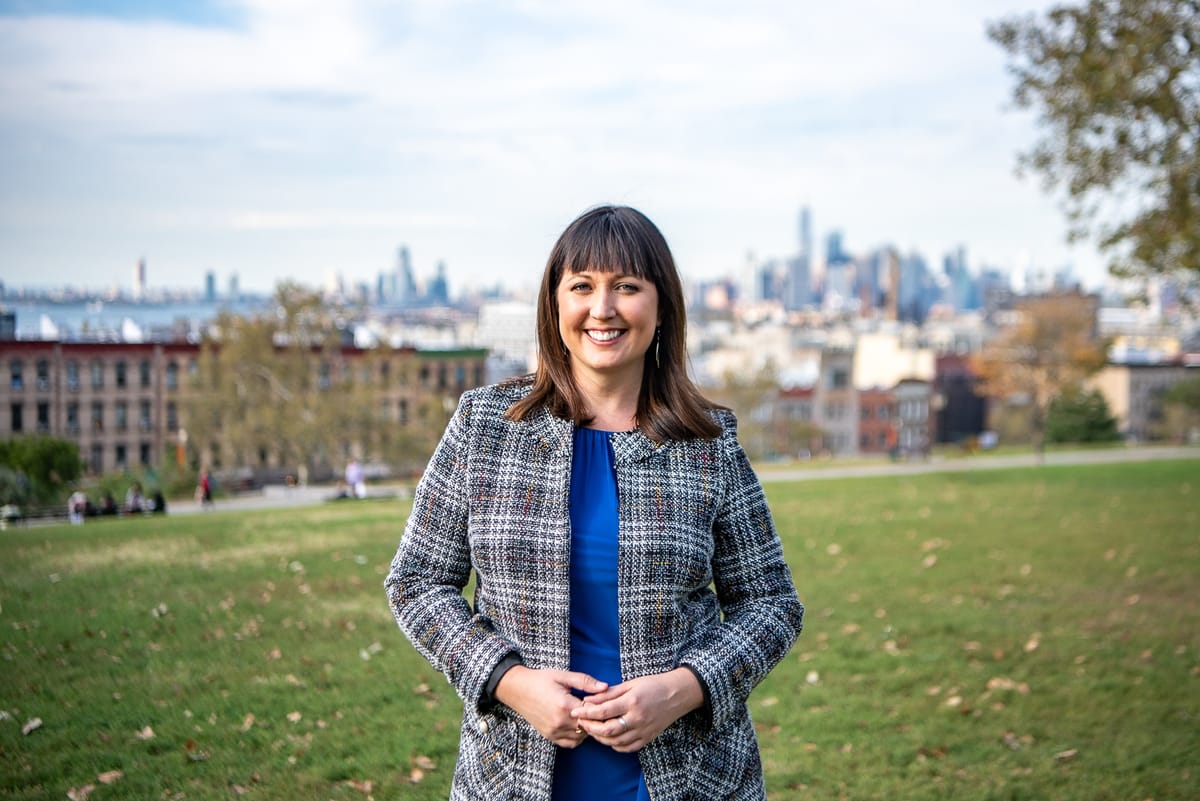Katherine Walsh Leads in Race to Represent Sunset Park in Assembly


Katherine Walsh, an urban planner, is leading in the race to unseat longterm Assemblymember Felix Ortiz to represent AD51, which includes Red Hook and Sunset Park along with bits of Carroll Gardens, Borough Park, and Bay Ridge, in the New York State Assembly.
Walsh raised $58,448.28 according to the January 2020 filings with the state, more, in fact than the incumbent Assemblymember Ortiz himself ($45,168), and more than either Genesis Aquino ($18,896.35) or Marcela Mitaynes ($23, 314.23). Walsh’s comprehensive approach to development, with a focus on the environment and sustainability, on green jobs, and a solid understanding of how the city and state can work best to address the neighborhood’s needs, challenges, and opportunities, seem to resonate — she raised money from more individuals than any other candidate in Assembly District 51.
Katherine Walsh grew up in Sunset Park, as did her parents, grandparents, and great grandparents, who emigrated here from Ireland to escape the great potato famine and settled in Red Hook, later moving to Sunset Park. She believes there is a better future for all of us — one where every decision, from jobs to healthcare, to transportation, is informed by a concern for the environment.
“We can make choices that support small businesses, improve education, and provide affordable housing all while securing a sustainable, peaceful future,” she says.
When asked about the main issues affecting the district, “Access to affordable housing is top of mind. How is land being used, what is it being built for? As you know, my focus is on climate change, and I’m the only candidate that has urban planning and also climate change planning background, and really thinking about how are we preparing our district. Red Hook was 8 feet under during Sandy and is still not resilient,” Walsh notes, saying that while some residents are fortunate enough to be able to move to higher ground, not everyone has that privilege, and we need to be thinking about that.
Immigration is another issue she is passionate about, ICE raids having targeted the heavily immigrant community of Sunset Park last summer, but so is healthcare and passing the New York Health Act. Her personal story is one affected by asthma, and concern for her neighbors similarly afflicted — Sunset Park has some of the highest asthma rates in the city, all while trucks rattle through on BQE and below on 3rd Avenue, where most of the new schools are to be opened.
As a member of Community Board 7, Walsh was deeply involved in considering the issues and concerns raised through the Industry City proposed rezoning process, which, she believes, left the community much better prepared to advocate for what it needs. She voted “No,” explaining that she believes the city can’t continue to plan for development like this, where the public sector would not consider mitigating the adverse effects of development on the surrounding community it acknowledges will persist, or invest in the surrounding communities.
“As an urban planner, I understand that the decisions and the way that we lock in planning now play out for generations,” just look at what Moses and the BQE did to Sunset Park, she points.
Much of Walsh’s focus in on advocating for green jobs, and helping bring both jobs and the kind of training necessary to help hire neighbors to fill them by working with CUNY schools, be it for offshore wind farms or anything else. And making sure the next representative is vocal, focused on bringing back resources to support the community they represent — the waterfront communities most affected by climate change.
Walsh believes it is time for a state assemblyperson who can connect all of these really complex and pressing issues like housing, infrastructure, and climate, and who will fight for more investment for our schools and to “get ICE out of the courts.”
“If we don’t tackle what we’re doing about our infrastructure and our health and our climate and our land-use decisions [with the climate in mind], then nothing else will work,” Walsh says. “It’s more about having a climate and environment lens, I think, not so much that, you know, climate and the environment is my issue.”
“Government has a really, really important role to play,” she continued. “With as much focus that we have at the national stage, we also really need to put that rigor and that focus on our local and state electeds. And we need to provide the same rigor and expectations because they represent us. Here in my district, we have the lowest voter turnout in all of Brooklyn, our assembly member has been in office for 26 years, he’s only been challenged at one time before. […] Our district deserves more. Be focused on the national stage, but don’t forget that a lot of what impacts your daily life happens because of what happens both in the city and the state.”
Why run now?
“What I’ve seen of our assembly member is that with the scale of the crisis and the timing that we can’t wait, we can’t continue to have an assembly member who’s not fighting, who’s not using all of the tools available to get legislation through committees and push for things and advocate and win votes and be out there actually advocating for our district,” Walsh said. “We now have a strong state senator with Zellnor Myrie. And we’ve had a city council member [Carlos Menchaca] the last several years who has also been advocating for the community. And so now is the time where we need that at the state assembly level vote.”



